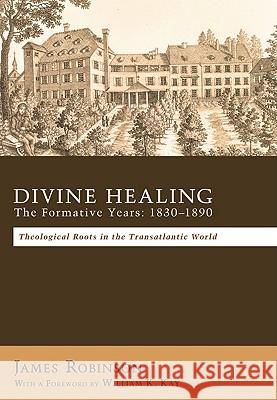Divine Healing: The Formative Years, 1830-1890: Theological Roots in the Transatlantic World » książka
Divine Healing: The Formative Years, 1830-1890: Theological Roots in the Transatlantic World
ISBN-13: 9781610971058 / Angielski / Miękka / 2011 / 326 str.
Divine healing is commonly practiced today throughout Christendom and plays a significant part in the advance of Christianity in Latin America, Africa, and Asia. Such wide acceptance of the doctrine within Protestantism did not come without hesitation or controversy. The prevailing view saw suffering as a divine chastening designed for growth in personal holiness, and something to be faced with submission and endurance. It was not until the nineteenth century that this understanding began to be seriously questioned. This book details those individuals and movements that proved radical enough in their theology and practice to play a part in overturning mainstream opinion on suffering. James Robinson opens up a treasury of largely unknown or forgotten material that extends our understanding of Victorian Christianity and the precursors to the Pentecostal revival that helped shape Christianity in the twentieth century.
Synopsis:Divine healing is commonly practiced today throughout Christendom and plays a significant part in the advance of Christianity in Latin America, Africa, and Asia. Such wide acceptance of the doctrine within Protestantism did not come without hesitation or controversy. The prevailing view saw suffering as a divine chastening designed for growth in personal holiness, and something to be faced with submission and endurance. It was not until the nineteenth century that this understanding began to be seriously questioned. This book details those individuals and movements that proved radical enough in their theology and practice to play a part in overturning mainstream opinion on suffering. James Robinson opens up a treasury of largely unknown or forgotten material that extends our understanding of Victorian Christianity and the precursors to the Pentecostal revival that helped shape Christianity in the twentieth century.Endorsements:"With interest in international Pentecostalism growing exponentially, the time is just right for James Robinsons carefully researched and wide-ranging investigation of its roots among the diverse healing and holiness traditions of the nineteenth century."-David HemptonHarvard Divinity School"This new study opens up vistas that enable us to see twentieth-century enthusiasm with new eyes: the revivals of Azusa Street in California, the excitation in the Celtic fringes of Britain, and the growing acceptance in Britain that the God of the bible could still heal had its roots in movements from the beginning of the nineteenth century, many of which have been neglected, marginalized, or forgotten. James Robinson, in this excellent book, traces their origins and influence. Theologically and sociologically they are a mixed bag, but this makes them more interesting and sometimes surprising."-Andrew WalkerKings College, University of London"James Robinsons history of nineteenth-century divine healing movements is a welcome addition to what has become a burgeoning field of study. A special virtue of this book is Robinsons close attention to the role of Britain and continental Europe in transatlantic developments. Robinson both builds effectively on previous scholarship and provides greater depth, plumbing rich archival resources to provide new insight into how personal experience informed the theologies of healing evangelists."-Candy Gunther BrownIndiana University"James Robinson has portrayed the nineteenth-century Healing Movement vividly in this well-documented study, particularly paying attention to the movement in Europe and the links to later Pentecostalism. Few works on this subject have been as comprehensive, and this one will stand as a standard reference for years to come."-Allan AndersonUniversity of Birmingham, United KingdomAuthor Biography:James Robinson was awarded his doctorate, from Queens University Belfast. He is the author of Pentecostal Origins: Early Pentecostalism in Ireland in the Context of the British Isles (2005).











